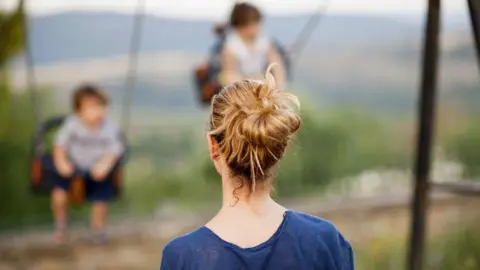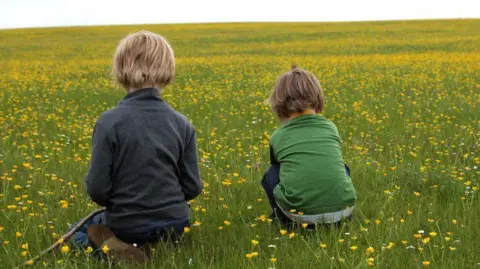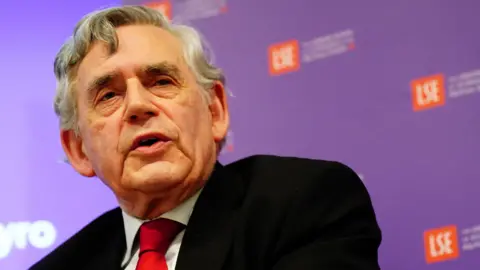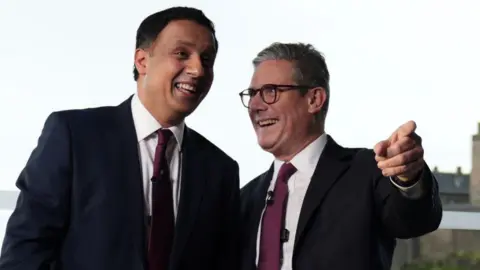Why is there fresh controversy over the two-child benefit cap?
 Getty Images
Getty ImagesA disagreement within the Labour Party has put the two-child benefit cap back in the spotlight. What is the policy, and why is it controversial?
The two-child cap prevents parents from claiming universal credit or child tax credit for a third child, with a few exemptions.
These benefits help with the cost of raising a child. Parents and carers might be able to get them if their children are under 16 or, if they are in eligible training, up to the age of 20.
The sum they are given depends on their income, how many children are living with them, and their childcare costs.
The cap, which came into effect in April 2017, was among changes to the benefits system which were announced by then Chancellor George Osborne in 2015.
At the time the Conservative government said it wanted people on benefits "to make the same choices as those supporting themselves solely through work".
Around 1.6 million children lived in a household affected by the policy last year, according to the latest statistics from the Department of Work and Pensions (DWP).
The number of households affected by the cap has increased every year since the policy was introduced, going from 71,000 UK-wide in 2017 to 450,000 in 2024.
Why was it controversial?
 Getty Images
Getty ImagesThe cap was opposed by anti-poverty campaigners.
The Child Poverty Action Group in Scotland said that abolishing the cap, which it estimated would cost £1.3bn, would lift 250,000 children in the UK out of poverty. That included up to 15,000 in Scotland.
Barnardo's chief executive Lynn Perry called the limit "one of the biggest policy drivers of child poverty" and said it should be scrapped.
And research from the Resolution Foundation think tank found that six out of 10 families affected by the two-child limit were already in work.
There has also been controversy over what became known as the rape clause.
One of the exceptions to the rules was for a child born as a result of "non-consensual conception".
The UK government was accused of forcing victims of rape to endure further trauma, making women "prove" they have been raped to receive child benefits.
However, the Conservatives insisted that the system ensured that women who had a child through rape would not be denied tax credits.
The most recent figures from the DWP showed that around 200 households in Scotland had been given an exemption because the child was conceived by non-consensual sex.
Campaigners brought a legal challenge against the two-child limit, arguing that the policy breached parents' and children's human rights.
The Supreme Court dismissed their case in 2021.
Why is the two-child cap in the news now?
 PA Media
PA MediaThe policy has been a thorny subject for the Labour Party, both when they were in opposition and now they are in government.
Sir Keir Starmer told the BBC's Sunday with Laura Kuenssberg programme a year ago that the policy would not change under a Labour government.
Sir Keir said he would not commit extra money to benefits without first growing the economy.
He quickly faced a backlash from across his party for his refusal to abolish the two-child limit.
In an interview with the Daily Record, Scottish Labour leader Anas Sarwar said he would press Sir Keir to scrap the policy if Labour won power.
Deputy leader Jackie Baillie then told the BBC's Good Morning Scotland programme that Scottish Labour was "very clear, we remain opposed to the two-child benefit cap".
During the election campaign other parties used the benefit cap as an attack line on both Conservatives and Labour.
The SNP's Westminster leader Stephen Flynn described UK Labour's stance on the issue as "utterly shameful" and First Minister John Swinney said it was "indefensible".
However while visiting Scotland Sir Keir repeated his belief that it would not be financially possible to axe the benefit.
That put him at odds with some political heavyweights in his own party, with former Prime Minister Gordon Brown telling Radio 4's Today programme that the cap is "condemning children to poverty."
What has happened now Labour are in power?
 PA Media
PA MediaScottish Labour have continued to demand that the cap be scrapped.
This week Mr Sarwar told the Daily Record newspaper that the limit is "wrong" and "needs to be reversed".
However he added that he was "pushing at an open door" as he believes the prime minister is keen to remove the cap as soon as financially possible.
Wendy Chamberlain, the deputy leader of the Scottish Liberal Democrats said scrapping the act would be the "quickest and most cost-effective way" to help children out of poverty.
Mr Sarwar's calls came as DWP statistics showed a total of 440,000 households across the UK were not receiving benefits for at least one child because of the policy.
Of that number, 59%, or 270,000, have at least one parent "in work".
And of those households affected, 26,000, or 6%, are in Scotland - a 7.7% increase on the previous year's figure of 24,160.
A further 1,000 or so Scottish households were granted an exception.
The figures also revealed that the most affected council area in Scotland is in Glasgow (4,500 households) followed by Fife (2,100) and North Lanarkshire (2,000).
Claire Telfer, from charity Save the Children Scotland, called the newest figures an "outrage" and "cruel".
